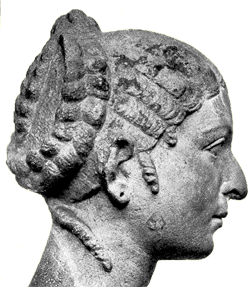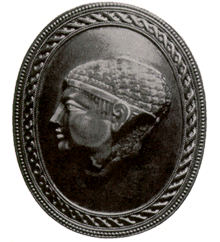 |
 |
| Fig. 11, Hellenistic Queens bust of Cleopatra VII, British Museum |
 |
 |
| Fig. 11, Hellenistic Queens bust of Cleopatra VII, British Museum |
“Miss Macurdy expects every body to be able, like herself, to have at her tongue's end every thing she ever heard or read. . . . Miss Macurdy amuses us so much sometimes—I used to read jokes about Boston people in the newspapers, and thought them all very much exaggerated, of course. But Miss Macurdy certainly goes far ahead of anything I ever read about Boston intellectuality.” (Adelaide Claflin, Vassar 1897, writing to her mother in 1894-1895 about her new Greek teacher)
Grace Macurdy devoted her life to becoming a classical scholar, and the impressive body of work that she left is an indication that she succeeded in this goal. She published 5 books, 3 of which have been reprinted at least once, 56 scholarly articles (including all the major British and American classical journals in her time), 17 book reviews, plus a number of poems and articles in more popular venues. A chronological list of her scholarly publications shows the range of her interests, from philology and etymology to literary studies, anthropology, social history, archaeology, and education.
She was in her late thirties when she received her Ph.D. from Columbia University in 1903, and she began almost immediately to deliver papers and publish articles, despite a heavy teaching schedule that included teaching Greek at Columbia University in the summers. Her early work reflects the influence of the Cambridge ritualists, led by British classicists Jane Ellen Harrison of Cambridge and Gilbert Murray of Oxford, with whom she developed a lifelong friendship. Her researches led her not only into the depths of the library of the British Museum, but also on adventurous treks through Greece and the Balkans. The dedication of Troy and Paeonia, the culmination of this phase of her work, hints at Macurdy's interest in the woman scholar, one who would not become a carbon copy of her male-defined predecessors: “I dedicate this work to Jane Ellen Harrison, one of the greatest of living scholars, the splendor of whose intellect is equalled by the candor and generosity of her spirit.” Harrison's response, recorded in an autograph letter in Vassar's Special Collections (dated 30 December 1925, less than three years before Harrison's death), indicates her delight with the book and the tribute:
At last the long looked for book has come! How can I tell you the intense pleasure you have given me. I feel it a great great honour to have such a book dedicated to me. I sat up late last night to read it right thru & was filled with fresh wonder at the vigour and originality of yr mind. . . . Dear Miss Macurdy you have given me one of the greatest pleasures in my life & I thank you from my heart.
 |
| Fig. 10, Hellenistic Queens sardonyx cameo with head of a Ptolemaic queen, Boston Museum of Fine Arts |
After the publication of Troy and Paeonia, Macurdy's work took an original turn, as she began to pursue the study of ancient women which would become her most enduring contribution to classical scholarship. Henry Noble MacCracken, president of Vassar College, was later to attribute this new direction in her scholarship to “her deep interest in the achievements of women and in their opportunities both for political and for social equality.” Both Hellenistic Queens and Vassal-Queens were well received when they were published, and they anticipate many of the features that would come to characterize the feminist approach to the study of women in antiquity developed in the 1970s—study of specific groups of women in the context of socioeconomic class, culture, and time period instead of an undifferentiated, abstract “Woman”; attention to the differences and biases of various types of ancient sources; use of evidence from many areas besides literary texts, including inscriptions, papyri, coins, sculpture, etc.
The focus of Macurdy's last book, The Quality of Mercy, on the development of “the humane virtues” in Hellenic thought was greatly influenced by her horror at the inhumanities being perpetrated in Europe in the late 1930s. Despite its title and subject, this book is not sentimental in its approach, and Macurdy's interest in women flashes to the surface in many places, as when she dismisses claims that Euripides was a misogynist: “Women were one of the poet's ‘causes’; he was interested in their psychology, not from malice, but because he realized that they, as well as men, had minds, and were potent for good or evil” (137). Her last articles dealt with portrayals of women in Athenian law courts and on the tragic stage. One of the final articles she published, “Had the Danaid Trilogy a Social Problem?” (Classical Philology 1944), exhibits the strong voice she had developed as both scholar and woman. In this article she spiritedly contradicts interpretations of Aeschylus’ play The Suppliant Women by eminent male scholars (George Thomson, Wilhelm Schmid, and even her dear friend Gilbert Murray) on the basis of her knowledge of Athenian law and custom and also on her perceptions as a woman. Rejecting the claim that the Danaids are portrayed as “unfeminine” women “actuated by a natural frigidity and hatred of men,” she argues that they are “Aristotelian heroines ‘like ourselves’”(98):
The Danaids, too, in the Supplices express the single terrified state of mind of girls who have undergone the horrid experience of being attacked by men whom they hate. This state of mind is neither unwomanly nor abnormal—rather, indeed, both womanly and normal. Moreover, it is not possible to divide Greek women sharply between the “Kinder, Kirche, und Küche” type and the “unfeminine” type. The Danaids, doubtless, in the end made as good wives and mothers as any other ladies of the heroic age. (99)
Though cataracts were causing her eyesight to fail, in 1945 Macurdy completed several brief biographies of ancient women for the Encyclopedia Britannica. In the last letter to Gilbert Murray written in her own hand (18 June 1945), she mentions that she can no longer read but hopes to have her eyesight restored by an operation: “I have various themes that I desire to follow up in that happy contingency.” So Grace Harriet Macurdy died as she had lived, full of plans for her next scholarly project.
Barbara F. McManus, <bmcmanus@cnr.edu>